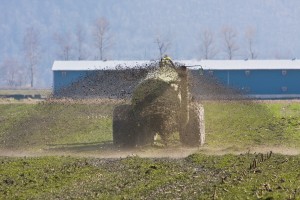L’Assemblée nationale: que de l’agriculture vraiment durable ‘climat intelligent’
L’ agriculture ne peut appelée ‘climat intelligent’ qu’au cas où elle contribue vraiment à la mise en vert de la production alimentaire et de la certitude alimentaire. L’Assemblée nationale néerlandaise en a adopté une motion de Marianne Thieme. En ce moment le concept est tellement manié à la légère qu’il peut même comprendre des étables énormes.

La politique du gouvernement est pleinement engagée dans l’agriculture intelligente climatique (Climate smart agriculture). Presque toutes les formes de l’agriculture en sont du ressort, même les étables énormes. L’Assemblée nationale néerlandaise veut maintenant un terme à cette imprécision.
Une grande majorité a voté pour une motion de Marianne Thieme pour une définition claire et nette de l’agriculture intelligente climatique. Désormais seulement l’agriculture, qui contribue vraiment à l’écologisation de la production alimentaire mondiale et qui assure le droit à l’alimentation, peut être appelée ‘climat intelligent’.
Marianne Thieme: « L’agriculture industrielle a un impact négatif sur les animaux, l’environnement et les droits de l’homme. Le gouvernement tente d’y imposer une sauce verte en appelant cette agriculture dévastatrice ‘climat intelligent’. Maintenant que l’Assemblée nationale néerlandaise met le holà à ces pratiques greenwashing, le gouvernement doit stimuler les initiatives véritablement durables ».
Par la motion adoptée, le gouvernement doit enfin vraiment répondre aux souhaits de l’Assemblée nationale néerlandaise comme au Rapporteur spécial des Nations Unies du droit à l’alimentation, en se concentrant sur l’agriculture écologique à petite échelle.
Abus
Des centaines d’ONG, y compris Cordaid et Amis de la Terre, ont déjà tiré la sonnette d’alarme avant à propos de l’abus du terme. Ils avertissent qu’en qualifiant à tort et à travers l’agriculture industrielle de ‘climat intelligent’ des entreprises multinationales peuvent ramasser des fonds qui devraient être utilisés pour la promotion des petits agriculteurs agro-écologiques.
Only when it truly contributes to the greening of our food production and security should agriculture be called “climate-smart”. The Lower House has passed a motion on this subject introduced by Marianne Thieme. At present, the term is used so casually that it occasionally even includes factory farms.

The government policy will fully engage in climate-smart agriculture. At the moment, this still includes virtually any form of agriculture, even factory farming. The Lower House wants to see an end to this lack of clarity.
A large majority of parliament has supported a motion by Marianne Thieme to adopt a clear and distinct definition of climate-smart agriculture. From now on, only agriculture that truly contributes to the greening of global food production and to ensuring the right to food may be called “climate-smart”.
Marianne Thieme: “Industrial agriculture puts severe pressure on animals, the environment and human rights. By calling this destructive form of agriculture “climate-smart”, the government has tried to give it a green veneer. However, now that the Lower House has foiled these greenwashing practices, the government will be forced to promote initiatives that are truly sustainable.”
The adopted motion will force the government to finally meet the wishes of both Lower House and the UN Special Rapporteur on the right to food, to concentrate on small-scale organic farming.
Improper use
Hundreds of NGOs including Cordaid and Friends Of The Earth have already sounded the alarm over the improper use of the term. They have warned that by designating industrial farming as “climate-smart”, multinationals will rake in the money that should be intended for encouraging small, agro-ecological farmers.